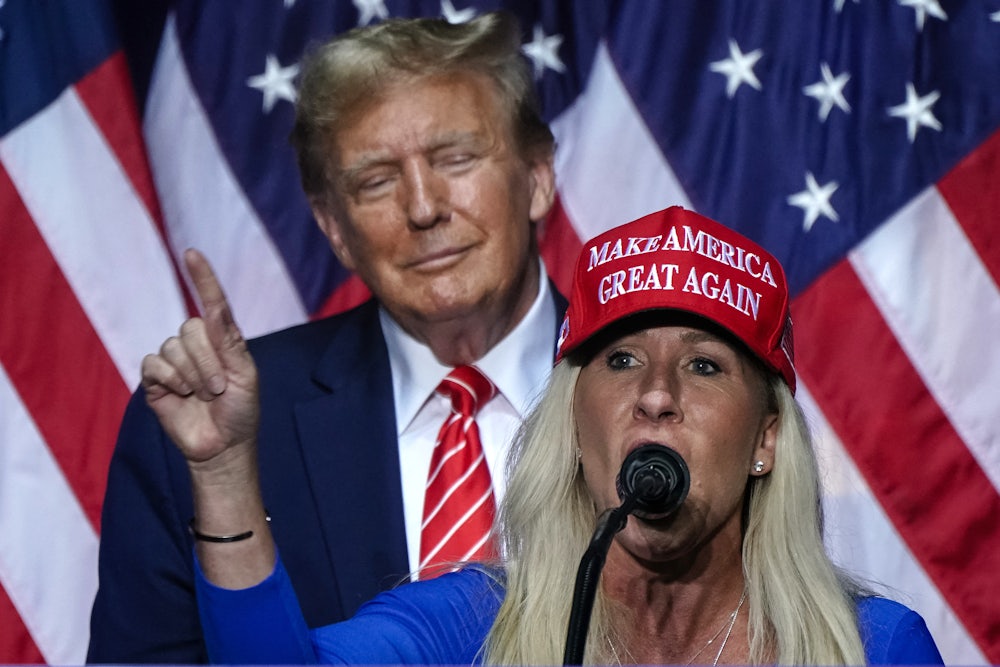Any praise—even if it is equivocal—of Marjorie Taylor Greene requires a lengthy disclaimer, so let’s get this out of the way. She’s a bigot, a political extremist, and a conspiracy theorist. Even by the standards of Republicans who have entered politics after the rise of Donald Trump, the Georgia congresswoman is out there. She’s not like other politicians. She’s not like other people, for that matter.
But Greene is, for once in her life, on to something. She sees what her fellow Republicans either don’t see or aren’t willing to acknowledge: Trump’s second administration has already failed and will doom its party in upcoming elections. And she wants to get credit for being the first prominent elected Republican to say this out loud.
Late on Friday, in a statement that took everyone by surprise, Greene announced that she would be resigning from Congress in January. Once one of Trump’s most vocal allies, she had been fighting an increasingly bitter war with him in recent months, attacking him on everything from health care to the Epstein files to foreign policy. Trump, she has argued, is betraying his movement, selling out his voters as his administration ignores rising costs, attempts to hide embarrassing secrets, and props up a failing government in Argentina and a murderous one in Israel.
She hit these points again in her resignation letter. “Most of the Establishment Republicans, who secretly hate [Trump] and who stabbed him in the back and never defended him against anything, have all been welcomed in after the election,” she wrote. “If I am cast aside by MAGA Inc and replaced by Neocons, Big Pharma, Big Tech, Military Industrial War Complex, foreign leaders, and the elite donor class that can’t even relate to real Americans, then many common Americans have been cast aside and replaced as well.”
If Greene is surrendering, she’s not exactly admitting defeat. Nor should she, now that Trump is a lame-duck president and the future of his MAGA movement is very much in doubt. It’s not too early to begin imagining—or in Greene’s case, positioning oneself for—a post-Trump politics on the right.
Since the beginning of Trump’s political career in 2015, efforts to turn his appeal into a coherent political program have always been quixotic. Still, the new administration spent much of the year attempting to fuse Trump’s various whims—throwback economic populism in the form of tariffs, authoritarian repression of domestic critics, fascistic efforts to remove immigrants—with older conservative and right-wing aims, namely the promotion of big business and the destruction of the federal government.
If there was a theory in the early stage of Trump’s term, it was that this hybrid administration could move so quickly and with such menace and authority that it could overcome its obvious weaknesses, the principal one being that this is not a particularly popular agenda. Trump was elected not because Americans were eager for a government built in his image but because prices were rising and Democrats had rendered themselves illegitimate by propping up a doddering octogenarian that a clear majority of voters had no faith in. Instead of fulfilling Trump’s actual mandate—to bring down prices—he and his vassals cloaked themselves in regal power and pretended they were infallible.
The result has been a uniform disaster. The Trump administration is finally, half-heartedly turning to issues like health care and the cost of living, but it’s obviously too late. The president and his allies ignored the well-being of the nation while pursuing a set of policy goals that were irrelevant to the concerns of their voters, let alone the wider citizenry. They have done so while arrogantly and systematically attacking or alienating anyone who disagrees with them. Now the party is on the verge of collapse. “More explosive early resignations are coming,” one House Republican told Punchbowl News about the mood within their caucus. “It’s a tinder box. Morale has never been lower. Mike Johnson will be stripped of his gavel and they will lose the majority before this term is out.”
Greene, like many of her colleagues, realized that the administration was failing and, unlike nearly all of them, began to speak about it. “What am I saying that can be criticized?” Greene asked during the government shutdown in October. “I’m saying the cost of living is too high, health insurance premiums are destroying the middle class, and Republicans have no plan.”
It’s hard to argue with any of that. Republicans really have no plan—a fact that was underscored Monday when the White House pushed back the unveiling of Trump’s health care plan. Greene has been loudly warning that the party is in serious trouble in the coming midterm elections, and she has been just as loud about why that is: Trump and his allies have failed to keep their promise to bring costs down.
Greene isn’t just interested in the midterms, however. What’s clear is that she’s attempting to position herself for a political future after Trump is gone. Her criticisms of the administration’s support for Israel, which she has accused of genocide, reflect a public opinion shift that is already underway: Voters, even Republicans, are far more critical of Israel than they were only a few years ago. Greene’s decision to lambaste the administration’s futile attempt to cover up the Epstein files—which likely include damaging information about Trump’s relationship to the convicted sex offender and alleged sex trafficker—again sets her up to argue that she held fast to principle when other Republicans seemed eager to aid the suppression of damaging truths. Perhaps above all else, Greene seems to be preparing for an argument that she can make after Trump’s administration has failed: Real Trumpism has never been tried.
In recent weeks, Trump has spent far more of his time focused on congressional Republicans—attempting to save face over the release of the Epstein files and attacking other turncoats, notably the libertarian-minded Kentuckians Rand Paul and Thomas Massie—in an effort to shore up support. Republicans aren’t afraid of him like they were a few months ago, and they have no reason to be. Where Greene goes from here is anyone’s guess, but one thing is already clear. She knows that this administration has failed and that her party is on the brink of collapse. And she’s getting out before the roof caves in.






